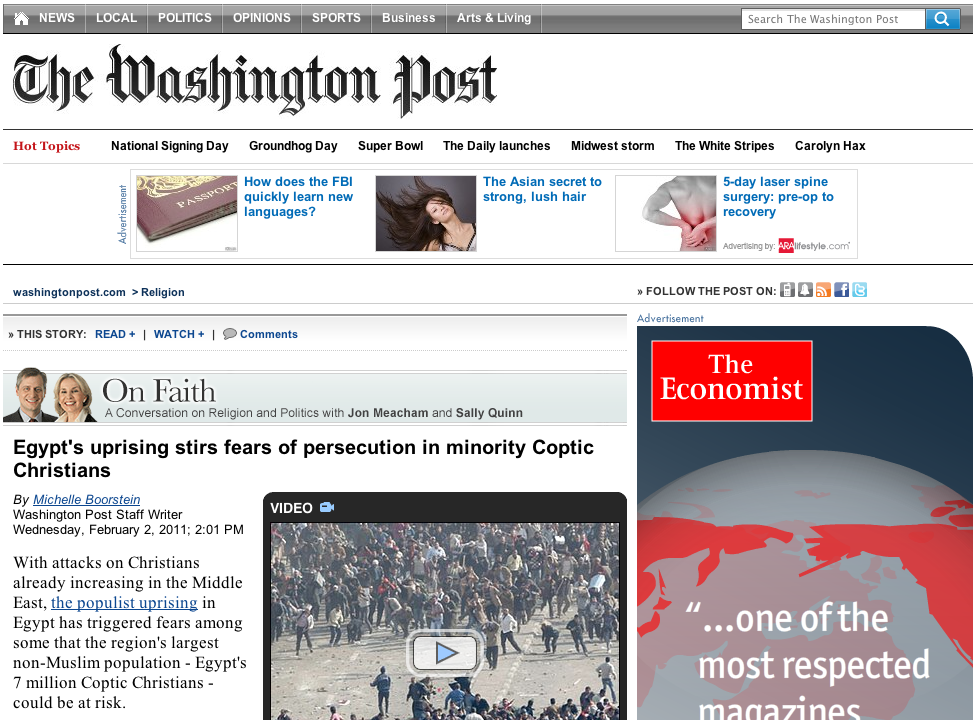• Interfaith Dialogue, Religious Freedom
Unrest in Egypt Stirs Fear and Hope
 With attacks on Christians already increasing in the Middle East, the populist uprising in Egypt has triggered fears among some that the region's largest non-Muslim population - Egypt's 7 million Coptic Christians - could be at risk.
With attacks on Christians already increasing in the Middle East, the populist uprising in Egypt has triggered fears among some that the region's largest non-Muslim population - Egypt's 7 million Coptic Christians - could be at risk.
Copt leaders in the United States said they are terrified that a new Egyptian government with a strong Islamic fundamentalist bent would persecute Christians. They are quietly lobbying the Obama administration to do more to protect Christians in Muslim countries and are holding prayer vigils and fasts such as one that ends Wednesday evening at Copt churches around the country, including four in the Washington area.
"The current situation for the Copts stinks, but [longtime Egyptian President Hosni] Mubarak is the best of the worst for us," said the Rev. Paul Girguis of St. Mark Coptic Orthodox Church in Fairfax County, which has about 3,000 members. "If Muslim extremists take over, the focus will be extreme persecution against Copts. Some people even predict genocide."
Some major U.S. Christian figures, including well-known evangelical leaders and representatives of the U.S. Conference of Catholic Bishops, declined to publicly discuss the situation in Egypt, saying they wanted to avoid bringing dangerous attention to the country's Christians by appearing to complain or to advocate for some particular political outcome.
Their trepidation stems from repeated attacks on churches in Iraq, where hundreds of thousands of Christians have fled in recent years, and from the New Year's Day bombing of a Coptic church in Egypt that killed almost two dozen worshipers and wounded nearly 100. The Coptic church is one of the oldest Christian communities in the world and is based in Egypt.
"Egypt is the bellwether because its Christian community is so large and is the strongest in the Middle East," said Paul Marshall, a global religious freedom expert and a fellow at the conservative Hudson Institute. "What happens to Christians in Egypt is very significant. Everyone is watching."
But not all American faith leaders are bracing for the worst. Joel Hunter, an evangelical pastor of a Florida megachurch and a frequent adviser to President Obama, said he's hearing a lot of optimism from Egyptian Christians who believe the uprising will lead to more freedom and religious liberty.
Many younger Christians in the United States also see the protests as something to celebrate, Hunter said, and older, more politically conservative Christians tend to be more skeptical of Islam generally and are worried about how a new Egyptian government will treat Israel.
So far, the protests have focused on jobs, free speech and democratic elections, not religion, so it's unclear what the end of Mubarak's rule would mean for religious minorities. But in recent years, Iraq has lost about half its historical Christian population because of persecution, and Christians have been leaving Iran and Lebanon in lesser numbers.
After last month's bombing of the Coptic church in Alexandria, Pope Benedict XVI publicly urged the Egyptian government and other leaders in the region to protect religious minorities. Egypt's foreign ministry spokesman said the pope's comments were "an unacceptable interference" in the country's internal affairs, and Egypt withdrew its ambassador to the Vatican in response.
Some U.S. Christian leaders said the situation in Egypt might put the issue of religious persecution abroad back on the radar of American Christians. A decade ago the freedom of Christians to worship in places such as Sudan was a top agenda item for American Christians, evangelicals in particular. But experts said this week that wars in Iraq and Afghanistan have absorbed people's attention.
At a congressional hearing last month about the persecution of Christians in the Middle East, Christian leaders urged the administration to lean harder on Egypt's leaders to investigate violence against religious minorities and to lay out a clear strategy in Iraq for their protection.
A 2009 survey by the nonprofit Pew Forum measured governmental and societal restrictions on religion and found that a number of the world's least tolerant countries are Muslim-majority. The list included Iran, Egypt, Indonesia and Pakistan, as well as India, which is majority Hindu. Concerns include bans on public preaching and conversion and the lack of prosecution for religion-based violence.
Some advocates for religious freedom note that moderate Muslims and non-majority Muslims also suffer attacks and that the problem is extremism, not Islam.

